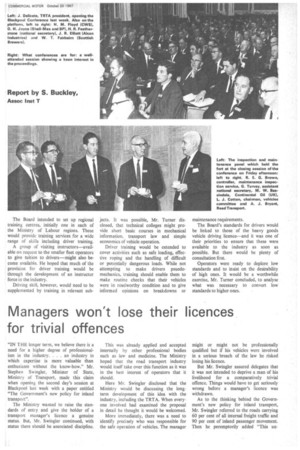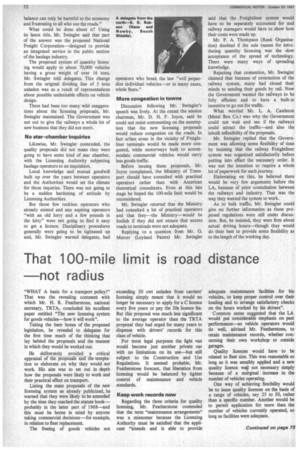Managers won't lose their licences for trivial offences
Page 73

Page 74

If you've noticed an error in this article please click here to report it so we can fix it.
"IN THE longer term, we believe there is a need for a higher degree of professional ism in the industry. . . an industry in which expertise is more valuable than enthusiasm without the know-how." Mr. Stephen Swingler, Minister of State, Ministry of Transport, made this claim when opening the second day's session at Blackpool last week with a paper entitled "The Government's new policy for inland transport".
The Ministry wanted to raise the standards of entry and give the holder of a transport manager's licence a genuine status. But, Mr. Swingler continued, with status there should be associated discipline. This was already applied and accepted internally by other professional bodies such as law and medicine. The Ministry hoped that the road transport industry would itself take over this function as it was in the best interest of operators that it should.
Here Mr. Swingler disclosed that the Ministry would be discussing the longterm development of this idea with the industry, including the TRTA. When everyone involved had examined the proposal in detail he thought it would be welcomed.
More immediately, there was a need to identify precisely who was responsible for the safe operation of vehicles. The manager might or might not be professionally qualified but if his vehicles were involved in a serious breach of the law he risked losing his licence.
But Mr. Swingler assured delegates that it was not intended to deprive a man of his livelihood for a comparatively trivial offence. Things would have to get seriously wrong before a manager's licence was withdrawn.
As to the thinking behind the Government's new policy for inland transport, Mr. Swingler referred to the roads carrying 60 per cent of all internal freight traffic and 90 per cent of inland passenger movement. Then he peremptorily added "This un balance can only be harmful to the economy and frustrating to all who use the roads."
What could be done about it? Using its latest title, Mr. Swingler said that part of the answer was the proposed National Freight Corporation—designed to provide an integrated service in the public section of the haulage industry.
The proposed system of quantity licensing would apply to about 70,000 vehicles having a gross weight of over 16 tons, Mr. Swingler told delegates. This change from the original dividing line of 5 tons unladen was as a result of representations about possible undesirable effects on vehicle design.
There had been too many wild exaggerations about the licensing proposals, Mr. Swingler maintained. The Government was not out to give the railways a whole lot of new business that they did not merit.
No star-chamber inquiries
Likewise, Mr. Swingler contended, the quality proposals did not mean they were going to have some kind of star chamber, with the Licensing Authority subjecting haulage operators to an inquisition.
Local knowledge and mutual goodwill built up over the years between operators and the Authorities would set the climate for these inquiries. There was not going to be a sudden hardening of attitude by Licensing Authorities.
But those few reckless operators who already existed and any aspiring operators "with an old lorry and a few pounds in the kitty" were not going to find it easy to get a licence. Disciplinary procedures generally were going to be tightened up and, Mr. Swingler warned delegates, bad
operators who break the law "will jeopardize individual vehicles—or in many cases, whole fleets."
More congestion in towns Discussion following Mr. Swingler's speech was lively. At the outset the session chairman, Mr. D. H. F. Joyce, said he could not resist commenting on the assumption that the new licensing proposals would reduce congestion on the roads. In fact urban areas in the vicinity of Freightliner terminals would be made more congested, while motorways built to accommodate commercial vehicles would carry less goods traffic.
Before issuing these proposals, Mr. Joyce complained, the Ministry of Transport should have consulted with practical operators rather than with American theoretical consultants. Even at this late stage he hoped the 100-mile limit would be reconsidered.
Mr. Swingler retorted that the Ministry had consulted a lot of practical operators and that they—the Ministry—would be foolish if they did not ensure that access roads to terminals were not adequate.
Replying to a question from Mr. G. Mercer (Leyland Paints) Mr. Swingler said that the Freightliner system would have to be separately accounted for and railway managers would have to show how their costs were made up.
Mr. P. A. Thompson (Rank Organisation) doubted if the sole reason for introducing quantity licensing was the slow acceptance of the spread of technology. There were many ways of spreading knowledge.
Rejecting that contention, Mr. Swingler claimed that because of contraction of the railway system, many had closed their minds to sending their goods by rail. Now the Government wanted the railways to be fully efficient and to have a built-in incentive to go out for traffic.
What worried Mr. L. A. Castleton (Metal Box Co.) was why the Government could not wait and see if the railways could attract the traffic—and also the inbuilt inflexibility of the proposals.
Mr. Swingler replied that the Government was allowing some flexibility of time by insisting that the railway Freightliner system was organized satisfactorily before putting into effect the necessary order. It was not the intention to require a whole lot of paperwork for each journey.
Elaborating on this, he believed there would be very few arguments before the LA, because of prior consultation between the railways and industry. That was the way they wanted the system to work.
As to bulk traffic, Mr. Swingler could give no further information as these proposed regulations were still under discussion. But, he insisted, they were firm about actual driving hours—though they would do their best to provide some flexibility as to the length of the working day.








































































































































